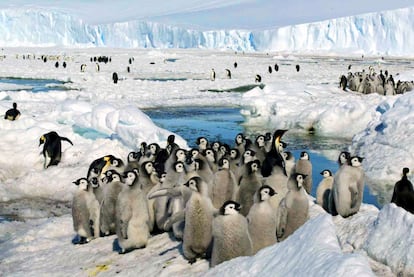The loss of ice around Antarctica is hurting the survival of emperor penguin chicks
Researchers reported Thursday that it appears that none of the chicks survived last year in four of five colonies in a region that had no ice left in the Antarctic summer

The loss of ice in one region of Antarctica last year likely resulted in none of the emperor penguin chicks surviving in four colonies, researchers reported Thursday. Emperor penguins hatch their eggs and raise their chicks on the ice that forms around the continent each Antarctic winter and melts in the summer months.
Researchers used satellite imagery to look at breeding colonies in a region near Antarctica’s Bellingshausen Sea. The images showed no ice was left there in December during the Southern Hemisphere’s summer, as had occurred in 2021.
Researchers said it is likely that no chicks survived in four of the five breeding colonies they examined. Penguin chicks don’t develop their adult waterproof feathers until close to the time they usually fledge, in late December or January, scientists say.
“If the sea ice breaks up under them, the young chicks will drown or freeze to death,” said Peter Fretwell, a researcher at the British Antarctic Survey and co-author of the study published Thursday in the journal Communications Earth & Environment.
Overall, the ice around Antarctica reached near record low levels last year. The researchers say that climate change will make such losses more frequent in the future.
Fretwell’s team has also completed a preliminary analysis of known nesting sites — visible in satellite photos because of colored guano, or poop stains, left on white ice — across Antarctica, the only continent where the emperor penguin lives. There are about 300,000 breeding pairs left of the world’s largest penguins.
Of 62 known penguin colonies, around 30% were harmed by low sea-ice levels last year — and 13 likely failed entirely, Fretwell said.
“That this could happen doesn’t shock me, but I’m shocked that it has happened already. I thought it would be further down the line,” said Daniel Zitterbart, a researcher who studies Antarctica for the Woods Hole Oceanographic Institution, but was not involved in the new paper.
If penguins aren’t successful breeding in one location, they may look for another site the next year, he said. While it’s possible for the population to recover from one or two bad breeding years, he’s worried about the future.
“If you look further out down the line, how many suitable places will be left?” he asked.
Sign up for our weekly newsletter to get more English-language news coverage from EL PAÍS USA Edition
Tu suscripción se está usando en otro dispositivo
¿Quieres añadir otro usuario a tu suscripción?
Si continúas leyendo en este dispositivo, no se podrá leer en el otro.
FlechaTu suscripción se está usando en otro dispositivo y solo puedes acceder a EL PAÍS desde un dispositivo a la vez.
Si quieres compartir tu cuenta, cambia tu suscripción a la modalidad Premium, así podrás añadir otro usuario. Cada uno accederá con su propia cuenta de email, lo que os permitirá personalizar vuestra experiencia en EL PAÍS.
¿Tienes una suscripción de empresa? Accede aquí para contratar más cuentas.
En el caso de no saber quién está usando tu cuenta, te recomendamos cambiar tu contraseña aquí.
Si decides continuar compartiendo tu cuenta, este mensaje se mostrará en tu dispositivo y en el de la otra persona que está usando tu cuenta de forma indefinida, afectando a tu experiencia de lectura. Puedes consultar aquí los términos y condiciones de la suscripción digital.








































